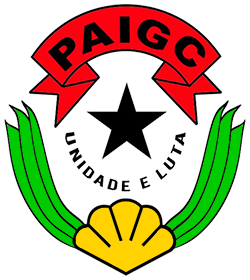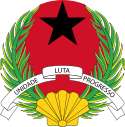Guinea-Bissau was claimed by Portugal from the 1450s to the 1970s. During most of this period, however, Portuguese control of the region was limited to a number of forts along the coast. Portugal gained full control of the mainland after the pacification campaigns of 1912–15. The offshore Bijago islands were not colonised until 1936. After independence in 1974, the country was controlled by a single-party system until 1991. The introduction of multi-party politics in 1991, brought the first multi-party elections in 1994. A civil war broke out in 1998–1999.

The politics of Guinea-Bissau take place in a framework of a semi-presidential representative democratic republic, with a multi-party system, wherein the President is head of state and the Prime Minister is head of government. Executive power is exercised by the government. Legislative power is vested in both the government and the National People's Assembly.

The African Party for the Independence of Guinea and Cape Verde is a political party in Guinea-Bissau. Originally formed to peacefully campaign for independence from Portugal, the party turned to armed conflict in the 1960s and was one of the belligerents in the Guinea-Bissau War of Independence. Towards the end of the war, the party established a socialist one-party state, which remained intact until multi-party democracy was introduced in the early 1990s. Although the party won the first multi-party elections in 1994, it was removed from power in the 1999–2000 elections. However, it returned to office after winning parliamentary elections in 2004 and presidential elections in 2005, since which it has remained the largest party in the National People's Assembly.

Elections in Guinea-Bissau take place within the framework of a multi-party democracy and a semi-presidential system. Both the President and the National People's Assembly are directly elected by voters.
Manuel Saturnino da Costa was a Bissau-Guinean politician who served as Prime Minister of Guinea-Bissau from 26 October 1994 to 6 June 1997.

The National Assembly is the unicameral legislative body of the Republic of Cabo Verde.

The unicameral Assembly of the Union of the Comoros is the country's legislative body. It was established in 2004.

The unicameral National People's Assembly is Guinea-Bissau's legislative body.
Francisco Benante is a Bissau-Guinean politician. He was President of the African Party for the Independence of Guinea and Cape Verde (PAIGC) from 1999 to 2002 and President of the National People's Assembly of Guinea-Bissau from 2004 to 2008.

Raimundo Rodrigues Pereira is a Bissau-Guinean lawyer and politician who was interim President of Guinea-Bissau from 3 March 2009 to 8 September 2009 and again in 2012, following the departure of President Malam Bacai Sanhá for medical treatment abroad; he continued in that capacity after Sanha's death. Pereira was elected as President of the National People's Assembly on 22 December 2008. Pereira is a member of the African Party for the Independence of Guinea and Cape Verde (PAIGC). He was ousted in a coup on 12 April 2012 and succeeded by Mamadu Ture Kuruma.

General elections were held in Guinea-Bissau on 3 July 1994, with a second round for the presidential election on 7 August. They were the first multi-party elections since independence, and also the first time the president had been directly elected, as previously the post had been elected by the National People's Assembly. In the presidential election, the result was a victory for incumbent João Bernardo Vieira of the African Party for the Independence of Guinea and Cape Verde (PAIGC), who defeated Kumba Ialá of Social Renewal Party in the second round. In the Assembly election, 1,136 candidates ran for the 100 seats, of which the PAIGC won 62.

General elections were held in Guinea-Bissau on 28 November 1999, with a second round for the presidential election on 16 January 2000. The presidential election resulted in a victory for opposition leader Kumba Ialá of the Party for Social Renewal (PRS), who defeated Malam Bacai Sanhá of the ruling African Party for the Independence of Guinea and Cape Verde. The PRS were also victorious in the National People's Assembly election, winning 38 of the 102 seats. This was the first time an opposition party won an election since the country's independence in the 1970s.

Indirect parliamentary elections were held in Guinea-Bissau on 15 June 1989. At the time, the country was a one-party state with the African Party for the Independence of Guinea and Cape Verde as the sole legal party. Voter turnout was 53.2%, and around 60% of the Assembly members were elected for the first time. The Assembly re-elected João Bernardo Vieira to the post of President on 19 June.

The Democratic Party of Progress is a political party in Guinea-Bissau.

The Parliament of the Kingdom of Laos was the bicameral legislature of the Kingdom of Laos from 1947 to 1975. It consisted of the National Assembly, whose members were popularly elected, and the Royal Council, whose members were appointed by the King or elected by the National Assembly. The last elections to the National Assembly took place in 1972.
This page is based on this
Wikipedia article Text is available under the
CC BY-SA 4.0 license; additional terms may apply.
Images, videos and audio are available under their respective licenses.






